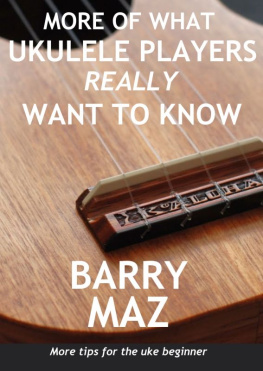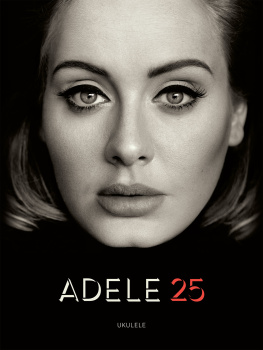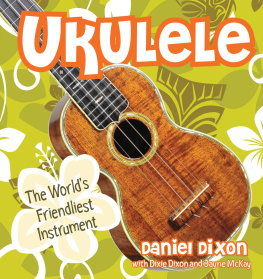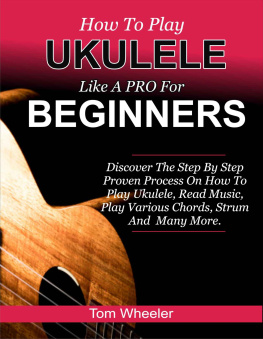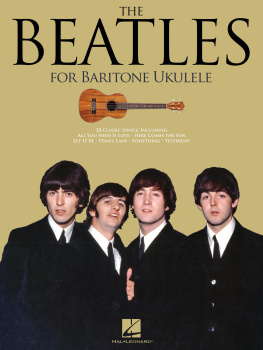More Of WhatUkulele Players Really Want To Know
by BarryMaz
Published byBarry Maz at Smashwords
Copyright 2012Barry Maz
To my Wife for her support in the endless hours I spend writing about theukulele, and for deciding to take the plunge and learn to playherself!
KeepStrumming....
Coverphotograph, Koaloha Pikake Soprano Ukulele Headstock imagecopyright Barry Maz 2011
INTRODUCTION
A little overtwelve months ago I completed writing my first book aimed squarelyat ukulele beginners, What Ukulele Players Really Want To Know. InJanuary 2011 it was launched as an ebook and then as apaperback.
It was somethingthat friends had been suggesting that I do for quite some time.They figured that I put so much time into writing the Got A Ukuleleblog that surely I could put all my thoughts and advice down in oneplace that readers could carry around with them. Unsure of exactlyhow it would pan out I put pen to paper (or rather, fingers tokeyboard, but you know what I mean) and launched it. It was a bookthat seemed to fill a gap in the market not a how to play kindof book, but a guide or handbook for new players to give them theanswers to the questions that traditional tutor books seemed tomiss.
The response tothe book was staggering and humbling in equal measure. Since itslaunch I have had so many kind words from people saying how muchthe guide helped them in starting out with the uke. Ive seensocial network comments where people are recommending it to others,and one reader got in touch to tell me he was buying a copy for hismother who wanted to learn to play like him! It went worldwide andended up turning the book into a bestseller. On a couple ofoccasions in 2011 the book was the number one selling music book onthe Kindle store in the UK (number two on the USA. dang!), and thenumber one music reference book in all book categories (paper andebooks) on the same site. When the book launched the ukulelecommunity was sensing something of a uke boom in the year aheadof us, but I didnt realise just how big a boom it would be.
That surge inpopularity is seen on Got A Ukulele also, and each month that goesby, visitor numbers leap to another high point. In fact ChristmasDay 2011 was the time it really showed. I can only imagine thatthere were thousands, perhaps tens of thousands of new ukulelesbeing opened on Christmas morning, and the blog had over twice asmany visits that day than ever before.
So I startedthinking, do I have more to say to the ukulele beginner? Hopefullythose beginners who read my first book would now be progressingwell and finding their own answers to things by now. Well I think Ido have more to share, and I thought it was about time to launch apart two, (the difficult second album), More Of What UkulelePlayers Really Want To Know.
This book takes aslightly different angle to the first book in many ways. In readingthis I assume you now have your ukulele and you have mastered thebasics of strumming and can get yourself through a few songs. Youmay find that one or two other things are bugging you, or that youfind yourself thinking about the ukulele and wanting to do morewith it. This new book provides a several more beginner tips onvarious elements of ukulele ownership and playing, but it alsoincludes some more general thoughts and advice that may assist inyour life with a ukulele and moving forward with it. In thatrespect I hope some of the chapters in this book inspire as well asinform.
I owe a hugeamount of thanks to those who supported Got A Ukulele and the firstbook during 2011 it was a hugely enjoyable year and I have got toknow a large number of wonderful ukulele people along the way.Thanks to some of those are included at the end of the book. Heresto fun ukulele times ahead!
Best wishes andhappy strumming.
Baz
1. THE UKULELEBOOM
It is now abundantly clear to anyone butthose with their heads in the sand that the ukulele has recentlyseen a huge upswing in popularity around the globe. I find that itis now quite difficult to go through a day watching or listening topopular culture without hearing a ukulele at some point. Anincreasing number of pop artists, television advertisements andtrailers are choosing the uke as the instrument of choice in theirmusical background. Social Media is bursting with new ukuleleplayers looking for advice and ukulele clubs are springing up allover the place around the globe. I have spoken to a number ofmusical instrument retailers recently and they tell me that theycant get hold of ukuleles quickly enough to meet customer demand.How long will it last and will the ukulele bubble burst?
Now it may seem odd for me to open abook about the ukulele on a negative, but t he very short answer to the questionis, yes, probably! Like everything, the popularity will start towane at some point, but there is no need to worry, it won't goaway. Music never does. (And if it ever does, take me out in theyard and shoot me a world without music would be a sad, sadplace).
All sorts of music tastes and interests comeand go in popularity over the years, but they never die, and sureenough they will come back again at some point in the future. Itwas ever thus. To understand where we are today with the ukulele,we need to go back in time to the last big upswing for this pluckylittle instrument.
So l et us roll back the clock to the 1930'sand 40's and we find that the ukulele was BIG! HUGE in fact! Thesewere the days before television networks and pop charts, but theukulele was the staple instrument for many music hall entertainers.Cliff Edwards, Roy Smeck, George Formby are names you may haveheard of, but there were countless others who, at some point intheir act they would grab a uke to sing, play and entertain themasses. In keeping with the happy nature of the instrument, many,like Formby used the uke in comic and whimsical songs, but as manyplayed the uke to accompany serious and touching songs, using itssimple voice to bring a note of sadness to a performance. It waseverywhere. Music stores on both sides of the Atlantic were full ofukes, and not guitars. A child's first instrument was most likely acheap ukulele, perhaps made of Bakelite or later, brittle brightlycoloured plastic. Then, like today, the public was exposed to ansignificant amount of ukulele music on the radio, in the movies andon stage. Also like today, when a member of the public picked up aninstrument they quickly realised that it was a fairly simpleinstrument to get to grips with, benefited from being cheap andportable and was a huge amount of fun to play. Looking back to thepresent day and we see that those attributes haven't changed onebit, only the style and the fashion of the players.
I appreciate that some of you may look back onthose early artists and cringe or exclaim that they are not yourthing. Some people actually dont like the link that the ukulelehas with the likes of George Formby at all and actively try toavoid it coming up in conversation. Whilst many people do stillenjoy that style of music, I am sure that the younger players todaymay find it old fashioned compared to the current crop of artiststoday who are bringing the uke into their compositions, likeBeirut, Noah And The Whale and Eddie Vedder. You may find, whenplaying a ukulele around those of the older generation, that youget ribbed by them asking that you 'play us some George Formby' orsimilar retorts. I have a healthy respect for Mr Formby, for sure,but I have to admit that I don't sit listening to his music on adaily basis.
But the thing is, those guys were actually nodifferent to the artists of today. Those guys WERE the hit artistsof their day. Formby and Edwards were, literally, megastars and assuch what they sang and played had a huge influence on the generalpublic. These people were the equivalent of the multi millionselling hit artists of today. To put it another way, George Formbywas the Jay Z of his day (now there is an image, Jay Z playing WhenIm Cleaning Windows...shudder.) George, Cliff and Roy may soundold fashioned now, but back then it was absolutely bang on themoment (and the money!). Were you alive in those days with even apassing interest in music, if you play the ukulele today I'd wageryou would have played it then and talked about it the way you donow. In fact, those artists careers were so big, that the ukuleleupswing of that period was actually much bigger than the one wehave now.
Next page
